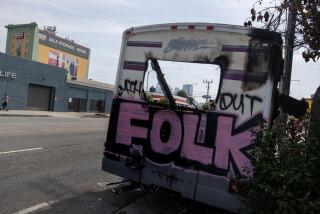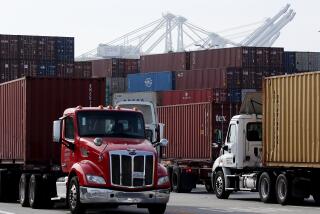Holden Defends Exemptions in Trucking Curbs
City Councilman Nate Holden on Wednesday defended the special-interest exemptions inserted in the city’s new rush-hour truck ban and said he will fight Mayor Tom Bradley’s attempts to have them removed.
Setting the stage for a political fight over the issue, Holden charged that a Bradley proposal to knock out the exemptions and set up an appeals board for individual cases is “earmarked for corruption.”
The ban, approved Tuesday by the City Council, is a Bradley initiative intended to cut traffic congestion and air pollution by barring 70% of large trucks from Los Angeles city streets during rush hours. It is the first such ban in the country and will take effect as soon as city departments work out the logistics and the council approves the details. The process is expected to take a minimum of three months.
Meanwhile, Holden, as chairman of the council’s Transportation Committee, controls the amendment process for the measure. Holden suggested Wednesday that an appeals board with broad authority to grant exemptions could be manipulated by Bradley or other politicians, possibly in return for campaign contributions.
The suggestion drew an angry response from officials in the mayor’s office, who until now have been reluctant to openly criticize Holden because of his position as chairman of the committee handling the proposal.
“Mr. Holden is either seriously confused, incoherent or intentionally misleading,” Deputy Mayor Michael Gage said. “His babblings are so far removed from reality as to cause the stretch of my imagination to even respond.”
Bradley had wanted an amendment added on the floor of the council that would eliminate exemptions for specific industries in favor of an appeals process that would deal with problems on a case-by-case basis. The approach was an attempt to deal with unanticipated circumstances likely to develop as the complex program gets off the ground.
The amendment, offered Tuesday by Councilman Richard Alatorre, called for flexible rules that would permit truck operations at specific sites and time periods. Further, truckers who contend that they are economically hurt by the ban could get an automatic, 30-day exemption while an appeals board evaluates the case.
The amendment also reflected a compromise worked out between Bradley’s office and the construction industry, which agreed to change its generally accepted starting time to 6 a.m. from 7 a.m.
In exchange, trucks carrying wet concrete, hot asphalt and structural steel to construction sites would be exempt from the rush-hour ban. The industry had argued that it is essential for the materials to arrive at the sites in a continuous flow once a project gets under way. At a press conference Wednesday, Holden said he opposed Bradley’s plan for an appeals process, saying: “He’s giving exemptions to everybody. . . . I only added essential services.”
The exemptions backed by Holden and approved by the council applied to trucks used to repair and maintain electrical power, telephones and pipelines, but also included trucks used in small construction materials businesses, produce and grocery trucks and those used for seasonal deliveries of such items as Christmas trees and watermelons.
The ban, first proposed by Bradley in September, 1988, was stuck for months in the committee as trucking interests lobbied to have it killed or, failing that, to have themselves exempted.
Holden finally sent the proposal to the council last week, but it emerged with a collection of special-interest exemptions that Bradley found unpalatable. The council approved the proposal unanimously Tuesday with the exemptions intact.
Bradley aides said Wednesday that they will attempt to get Holden’s exemptions removed during the three or more months it will take city departments to develop the program, which must be approved again by the City Council.
“Any industrywide blanket exemption raised would be likely to cause a flood of special-interest lobbying at this stage,” said Bill Bicker, Bradley’s transportation adviser. “What we’ve done over the course of the year is try to convince everybody we’ll set up some rules that will apply across the board.”
At this point, Bicker said, “We don’t think we’re wise enough to determine if a given industry requires a longer-term exemption.”
More to Read
Sign up for Essential California
The most important California stories and recommendations in your inbox every morning.
You may occasionally receive promotional content from the Los Angeles Times.










